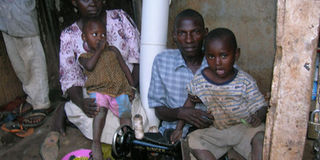Crafting beautiful sandals

John Ssenyange with his family. Below, displays merchandise by the roadside. PHOTOS BY AMOS NGOMOYA
What you need to know:
DETERMINED. John Ssenyange who was crippled by polio, makes African craft sandals to fend for his family. He shares his story with Amos Ngwomoya.
Seated on a cushion at the veranda of an old house, John Ssenyange, a a physically handicapped cobbler holds his sewing machine tightly as he fixes coloured beads in a neat pattern to patch on the straps of a pair of sandals. Meanwhile, his wife is busy preparing breakfast. And soon, she asks: “Mwami, shall I make you a cup of tea or porridge?” “tea, of course,” Senyange answers as he sews away while speaking to me.
Ssenyange, 34, is the first born of 11 children. He dreamt of being a successful scholar with a powerful office. This did not come to pass as he suffered from polio that crippled his legs and his mother suffered from a strange disease.
Besides, his father spent all the savings on getting his mother treated. She recovered.
“When my mother recovered, my father was frail and soon after he passed on,” recalls Ssenyange.
The struggle
However, because Ssenyange loved school, he sold coffee, chicken and pigs he had inherited from his father to pay his school fees. The money was inadequate and he dropped out of Primary Four at Kainisiyu Primary School.
He went to live in Zana on Kampala-Entebbe Highway with his brother who used to work for National Water and Sewerage Corporation. His stay there was however, short-lived because his brother died in a fatal accident. “My brother had promised to give me capital but he died before he could fulfil his promise. Almost resigned, I went back home to stay with my mother,” he says in a shaky voice.
While at home, Ssenyange’s mother took him to learn how to repair radios and television sets. Much as he mastered the skill, he did not have capital to rent out a workstation. in 2005, he went back home and started working from there. Around the same time, he got married.
Moving to Kampala
Having saved Shs60,000, Ssenyange, came to Kampala to look for any job that could earn him a living. First, he went to Kawaala in his search of accomodation. He met a ‘broker’ who promised him a room at Shs30,000 per month but he had to pay three months upfront.
He unsuspectingly, gave away the money and pleaded to clear the balance of Shs30,000 after a month. Little did ssenyange know that he was being conned by a fellow tenant.
The following day, the landlord came demanding rent. He narrated to him the story of how he had given money to ‘another’ landlord. “The real landlord came asking me for rent but i told him of how I had cleared but had a balance of Shs30,000. He sympathised and let me stay and also he gave me Shs30,000 for upkeep and I was excited,” says Ssenyange.
It was the beginning of peace in his life.
“In my room, I had only a mat and cooking utensils. I also bought some posho; I would take one cup of porridge for breakfast and another on return from work. I tried a hand at shoe repair and it turned out that I could make at least Shs1,000 a day.”
Ssenyange made friends with clients who brought along their friends.He became popular in Kawala. Back at home, the wife had become pregnant and was due and he had to shop for the baby. Two days after delivery, Senyange’s wife came to stay with him.
Making sandals
One day, his star shone when an organisation which was training people in how to make African craft sandals approached him.
One had to pay Shs400,000 as tution fees. Ssenyange did not have that much money and friends advised him to join FINCA microfinance in Kawempe and take a loan. He trained with the rest in Mengo and after that was given a Shs500,000 loan. He had to pay Shs25,000 a week. “I made the sandals and earned some money that enabled me to service my loan in a short time” boasts Ssenyange. “Of my little savings, i gave my wife Shs50,000 and sent her back home to start a business.”
After a while, Ssenyange felt lonely. He called back his wife and taught her how to make the sandals. They now ply the trade together. He shifted from Kawala and now stays in Kasubi where they take their merchandise every evening.
Challenges
He says the machines and raw materials used are expensive. Inadequate capital is a problem too. “If I had enough money, I would buy more machines, raw materials and produce many pairs of sandals.”
Despite the challenges, Ssenyange can sustain his family. Stella, his first born is in Primary Two at Kasubi Children’s Centre. He has also taught five boys how to make African sandals. He plans to build his own home and a school that trains sandal makers.




